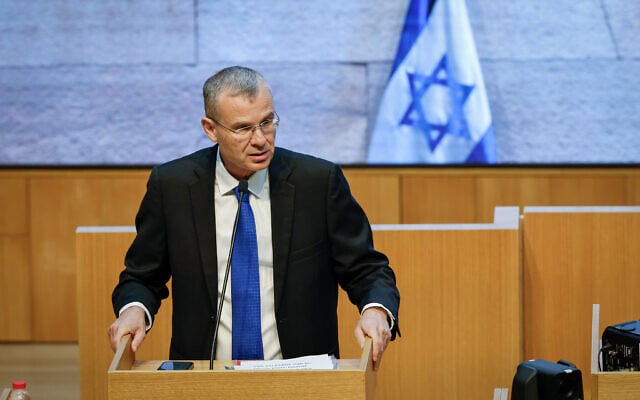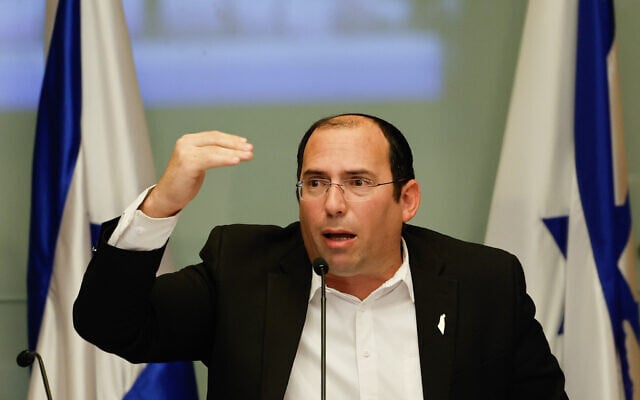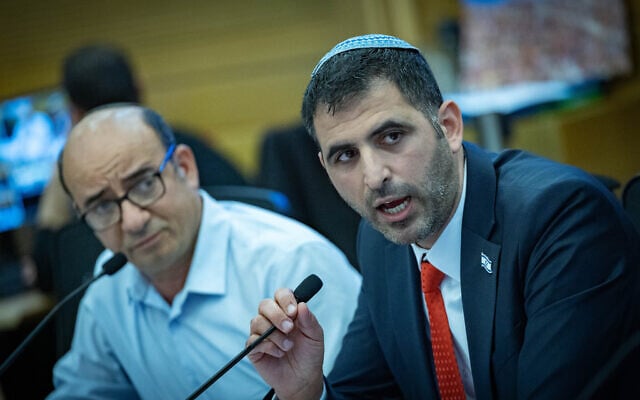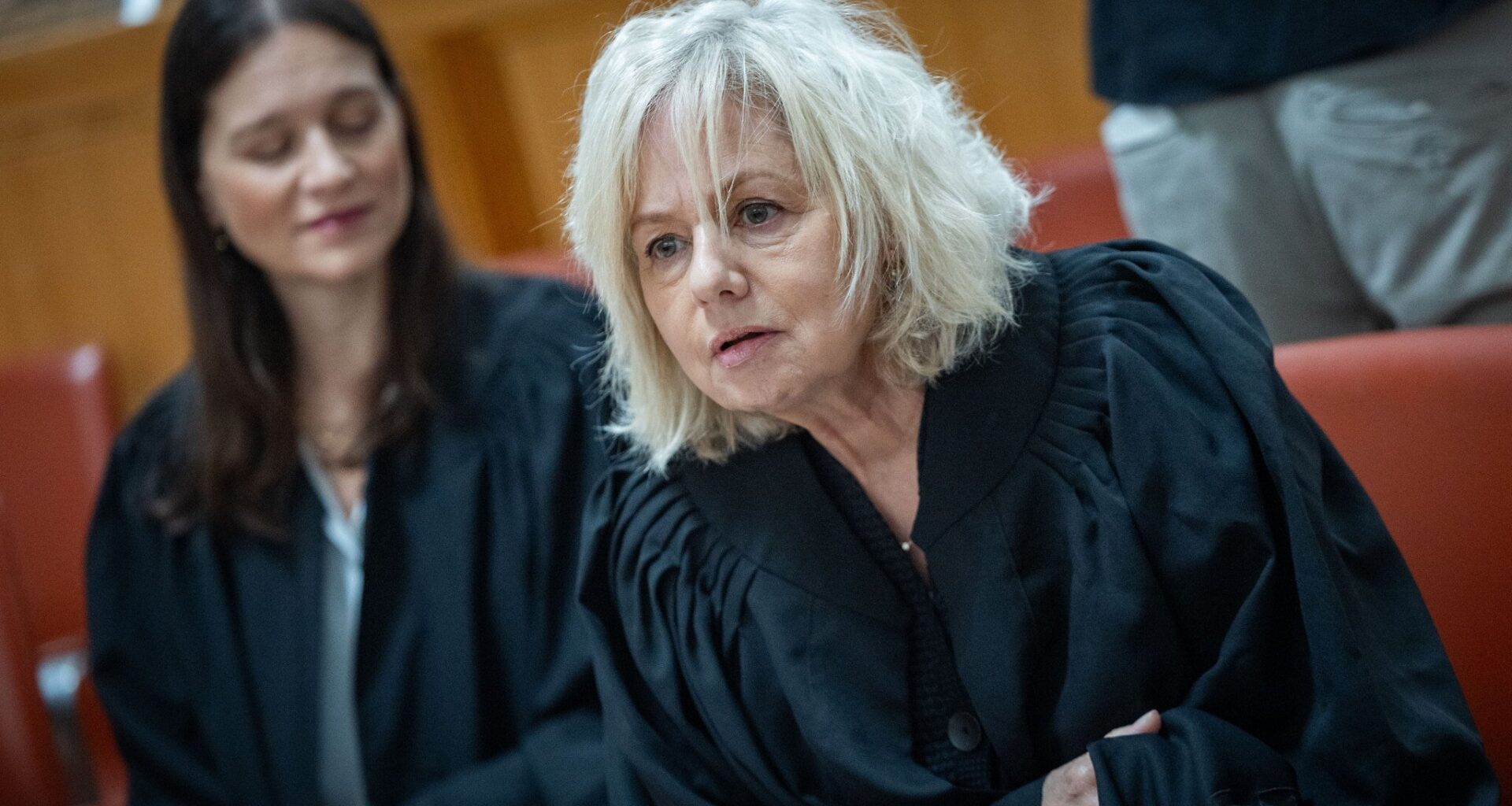A bill that would effectively deprive the attorney general’s position of all authority is slated to be brought on Wednesday for a preliminary reading in the Knesset plenum, which is expected to advance it to committee.
The legislation will likely face sharp criticism from the opposition, since the attorney general today acts as one of the few checks on executive power in Israel’s system of government.
The bill comes as the coalition has been trying unsuccessfully for months to fire the sitting attorney general, Gali Baharav-Miara, accusing her of working against the government and undermining its interests. Baharav-Miara has opposed several of the government’s signature legislative initiatives, including its controversial proposed judicial overhaul, and has also refused to defend the government in proceedings in the High Court against some of its policies and legislation.
The legislation in question would split the position of attorney general into three separate jobs. It would preserve the role of an attorney general as the legal adviser to the government, while also creating a position of prosecutor general and of government representative to the court.
Under the current system, the attorney general’s position papers containing their interpretation of the law are binding on the government and its agencies. But under the new legislation, the government would not be required to act in accordance with the position papers.
Get The Times of Israel’s Daily Edition
by email and never miss our top stories
By signing up, you agree to the terms
The management of the Attorney General’s Office would also no longer be under the sole control of the attorney general; rather, it would be subject to the government and the justice minister.

Justice Minister Yariv Levin speaks during a Knesset plenum session, June 23, 2025. (Noam Moskowitz/Knesset Spokesperson)
The attorney general would also not be automatically entitled to attend cabinet meetings and would need to be invited by the prime minister.
If the legislation — which has the backing of Justice Minister Yariv Levin — passes, all three of the newly created roles would become politically appointed positions.
The attorney general would be nominated by the prime minister and justice minister, and approved by the cabinet. Currently, a public, professional committee headed by a retired Supreme Court justice recommends a candidate for the cabinet to approve. The role would be open to candidates who have worked as lawyers for a minimum of 10 years.
The prosecutor general, who would head the criminal prosecution service, would be nominated by the justice minister and confirmed by the Knesset Constitution, Law and Justice Committee, which is always controlled by the ruling coalition. The prosecutor general would be required to have served as a criminal lawyer for at least 10 years.
The justice minister would appoint the government’s representative in the courts. That person would represent the government in legal proceedings regarding legislation and executive actions.
The government’s legal representative would need to have 10 years of experience as an attorney representing parties in court. They alone would be able to represent the government in court, in a departure from the current situation, which allows the attorney general to refuse to represent the government if opposed to its position (whereupon the government can request the attorney general’s permission to get private counsel).

Chairman of the Knesset Constitution, Law and Justice Committee MK Simcha Rothman speaks at a committee hearing, September 30, 2025. (Oren Ben Hakoon/Flash90)
Similar legislation put forth by Constitution, Law and Justice Committee chairman MK Simcha Rothman, was approved by the Ministerial Committee on Legislation earlier this year.
The Attorney General’s Office opposed the bill at the time, saying there was “a heavy suspicion that it is designed to advance personal interests… which are tied to ongoing criminal proceedings and investigations.” Prime Minister Benjamin Netanyahu is on trial on corruption charges, which he and supporters deride as a “witch hunt.” Levin at the time publicly backed the bill, saying it was designed to prevent “selective enforcement” against government officials by the head prosecutor.
The proposed legislation is also related to the 2023 judicial overhaul spearheaded by Levin and Rothman, which aimed to weaken the judiciary and sparked massive nationwide protests.
The government began its effort to fire Baharav-Miara in March this year, and sought to get a recommendation to do so by the Grunis committee, the traditional approval method for hiring and firing the attorney general.
When the coalition could not find a former justice minister or attorney general who would agree to sit on the panel, as required, it passed a new cabinet resolution creating a ministerial committee to bypass the committee and voted in August to fire her.
Last month, a nine-justice panel of the High Court ruled unanimously that the government must cancel its decision to fire Baharav-Miara through its ad hoc committee process, and must revert to going through the Grunis committee.
The government, in response, told the court that it would do so only if the committee could convene without an ex-justice minister or attorney general. In the meantime, her firing is effectively frozen, although the coalition has sought to shun her, including by not inviting her to US President Donald Trump’s speech to the Knesset earlier this month.
Separately, Communications Minister Shlomo Karhi has reportedly enlisted the support of the Knesset’s Haredi parties for controversial legislation opposed by Baharav-Miara that could dramatically alter the state of Israel’s broadcast media.

Communications Minister Shlomo Karhi attends a National Security Committee meeting at the Knesset, January 8, 2025. (Yonatan Sindel/Flash90)
According to a Channel 12 news report on Monday, Karhi informed lawmakers from Shas and United Torah Judaism that if they back his desired media reforms, he will support increasing the power of rabbinical courts, a longstanding demand of the two Haredi parties.
Karhi’s legislation would give the government significant control over broadcast media regulations by establishing a new regulatory council, with a majority of members chosen by the communications minister, which would wield an array of powers over broadcast media, including the ability to issue hefty fines.
Baharav Miara has criticized the bill, saying it would enable “political interference in the work of broadcast bodies and endanger free press in Israel.”
Times of Israel staff contributed to this report.
You appreciate our journalism

You clearly find our careful reporting valuable, in a time when facts are often distorted and news coverage often lacks context.
Your support is essential to continue our work. We want to continue delivering the professional journalism you value, even as the demands on our newsroom have grown dramatically since October 7.
So today, please consider joining our reader support group, The Times of Israel Community. For as little as $6 a month you’ll become our partners while enjoying The Times of Israel AD-FREE, as well as accessing exclusive content available only to Times of Israel Community members.
Thank you,
David Horovitz, Founding Editor of The Times of Israel

